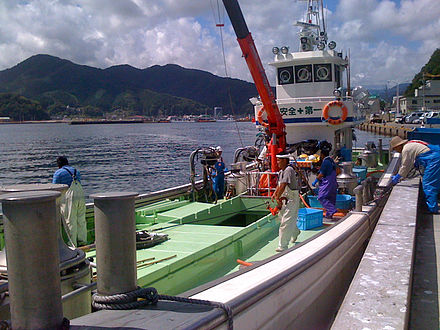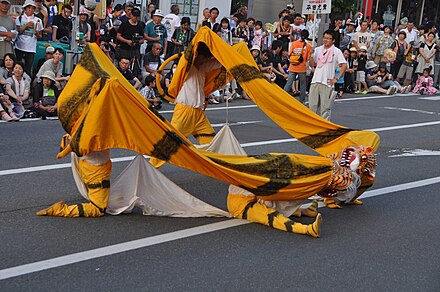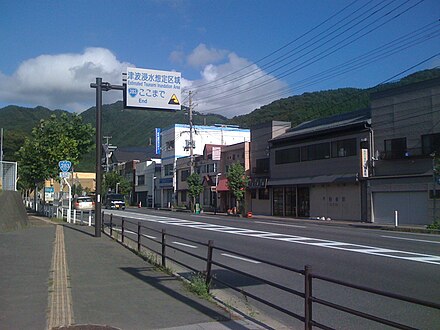Kamaishi - city in Iwate Prefecture, Japan
 Kamaishi (釜石) is an ex-steeltown in Iwate, Japan.
Kamaishi (釜石) is an ex-steeltown in Iwate, Japan.
Get in
Kamaishi is on the Pacific Ocean, on the eastern end of JR's Kamaishi Line, which extends from Hanamaki in central Iwate to Kamaishi on the coast. On this route is also Shin-Hanamaki Bullet Train Station, which is on the Tohoku Shinkansen Line. Trains only run a few times a day, so plan your schedule carefully.
Get around
Nestled in a long valley, Kamaishi proper is 14 km long by (as little as) 200 m wide. When you're on the main road, it's difficult to get lost. The hamlets in the neighbouring valleys (one to the north, and one to the south) are part of Kamaishi, so a city bus may suddenly take a sharp left and take off through a mile-long tunnel.
JR's Kamaishi line has four stops within the city, used by commuters, and a couple of bus lines.
See
 The Kamaishi Dai-Kannon is an enormous statue of a god, watching out over fishermen as they go out to sea. It was built in 1970, so lacks the historical significance of other statues, but you can go up inside and look out from her forehead, Statue-of-Liberty style.
The Kamaishi Dai-Kannon is an enormous statue of a god, watching out over fishermen as they go out to sea. It was built in 1970, so lacks the historical significance of other statues, but you can go up inside and look out from her forehead, Statue-of-Liberty style.
Kamaishi has a traditional dance called Toramae, which translates to Tiger Dance. Each Tiger Dance group is composed of members of the same company or organization. During festival times, Tiger Dance teams can be seen throughout the day and night practicing and performing in the streets, accompanied by a taiko drummer, a handful of bamboo flute players, and a handful of singers with iron cymbals. Tiger Dance groups will travel along the main streets, entering businesses (and sometimes homes), and will perform a short dance to the people inside. This is viewed as a blessing and a favor and the dancers do not expect payment, although a glass of beer, sake, or tea would be readily accepted.
Do
 Primarily an industrial town, Kamaishi boasts few major tourist draws. Kamaishi Dai-Kannon is located in Odaira, just south of the Kamaishi proper. Just above the Dai-Kannon is the Iron and Steel History museum, which outlines Kamaishi's history as the first center of Japan's steel industry, as well as the history of steel production in Japan.
Primarily an industrial town, Kamaishi boasts few major tourist draws. Kamaishi Dai-Kannon is located in Odaira, just south of the Kamaishi proper. Just above the Dai-Kannon is the Iron and Steel History museum, which outlines Kamaishi's history as the first center of Japan's steel industry, as well as the history of steel production in Japan.
Despite being on nestled on the Pacific Ocean, much of the coastline in the city is devoted to docks and ports. For beach seekers, the two best options are Nebama Beach in Unosumai (just three train stops north of Kamaishi) and Namiita Beach in Namiita-Kaigen (a few more stops north from Unosumai). Nebama runs along a small bay, allowing for few - if any - large waves to make it to shore. Namiita does have large waves and is a big draw for surfers from all over Iwate. Wave size depends on the season, but surfers can be found at Namiita from April to October. A small surf shop located just behind the tree line from the beach provides rentals for surfboards, wet suits, and body boards.
Festivals include Senbutsu in late January, Hanabi Matsuri (Fireworks Festival) in August, and Kamaishi Matsuri in mid-October.
Buy
Eat
Kamaishi is known for its extremely fresh seafood, which can be bought from local merchants or enjoyed at the many restaurants in town.
In the center of town and along Route 283 there are many restaurants to choose from. Of course, there are a good number of traditional (and expensive) Japanese food restaurants. For those looking for something different, there is Hiroshima-ya, a well-known locally owned ramen shop one block from Bay City Hotel and Sun Route Hotel. The owner is good-natured and very friendly with his guests, often offering a free beer (or two) or tastes of new recipes he is developing. The must-try on the menu is tomato ramen. Many Japanese find the idea of tomato ramen to be very strange (and may be reluctant to try it), but most find that it is an interesting twist on traditional ramen.
Another restaurant to keep on your list is Poto Mae No, located adjacent to the NHK building on the northwestern shore of Kamaishi Bay. It offers mainly western-style food (pastas, rice omelets, hamburger steaks), but what sets this restaurant apart is its dishes are made exclusively with organic food products. An extremely friendly staff complements the light and modern atmosphere of the restaurant.
Other restaurants in town offer curries, okonomiyaki, Korean-style grilling, and most other kinds of East Asian cuisines.
There are also many izakayas to choose from. Yoronotaki and Tsubohachi, which are within eyesight of Bay City and Sun Route Hotels, are chain izakayas with locations all over Japan and are very popular for work parties. As with all izakayas, the menu is limited to fried foods, unremarkable seafood, and limited-time-only dishes, as well as a drink menu centered on beer, chu-hi, sour mixed drinks, sake (both local and national brands), and a limited selection of wine. Two locally owned izakayas worth visiting are Wakou and Inaka Pe, which are in Nakazuma neighborhood.
For international flavors, the restaurant on the first floor of Sun Route Hotel offers a menu with European influences, and an extensive (by Japanese standards) list of French wines.
Drink
Sleep
Go next
Head north to Miyako
Kamaishi-shi
2nd-order administrative division
Iwate Prefecture
Primary administrative division